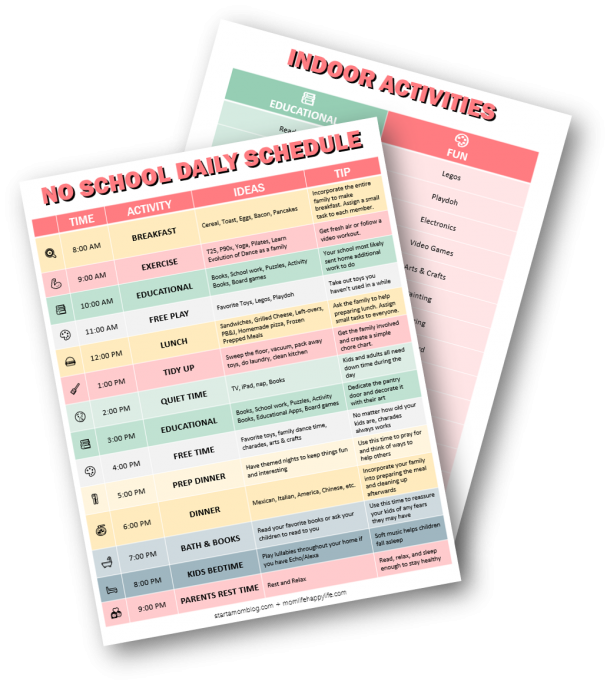
“I’m boooored!!”
How many times have you heard this expression since the quarantine began? Even before the quarantine, kids were bored! BAM! Quarantine starts, school is canceled or partly online, sports practices are canceled, grandma’s house is a no-go, and going to see a movie is no longer a thing…and of course the kids (and parents) are trying to figure out just how to not pull out every last hair! We can all agree now that we never knew the true meaning of the word “bored” until the quarantine began.
Somehow, in the midst of all this, there is this heavy feeling that parents have that makes them feel that unless they have found a way to engage their kids in something “productive,” educational, or structured…the entire day…then their children will turn into mind-numb zombies.
As a teacher and a parent, I can tell you that couldn’t be further from the truth! Don’t get me wrong, I’m not against making a structured schedule for part of your child’s day, but if there is also a part of the day with nothing structured to do and your child is bored…that is actually a very GOOD THING!! You are actually setting them up to have the mental space to be creative! And creativity is now identified as one of the top skills needed in order to be successful in the 21st century!
Meet “Joey”
Joey is an 8 year old boy. He can’t believe that his mom could be so mean as to not let him watch another episode of Wild Kratts. He sits in the backyard staring at the trees, bored out of his mind. He wonders who the mean person is who made up this whole quarantine thing.
As time passes, he begins to notice how the squirrels climb up the trees so easily. He begins to wish he could climb up the tree more easily like them. He starts to wonder what things he would need to help him be a better climber. First he thinks that he needs better grip on his hands. He goes to the garage and finds his dad’s rubber gloves that he used in renovations. He tries climbing the tree with the rubber gloves, they help a bit, but they are not too helpful on their own.
He visualizes that he needs something wrapped around the tree that would help him have more friction. He goes to his little sister’s room and steals grandma’s handmaid blanket and tries wrapping it around the tree and pulling both ends of the blanket as he inches up. It works a bit, but his feet slip.
He realizes he needs more friction in his feet. He tries putting on his soccer cleats. Suddenly, with all 3 items, he begins ascending quickly and easily. He succeeds in climbing pretty high and without exhausting himself! He gets half-way up the tall tree and almost falls so he decides that he will end his experiment. However, he feels an immense sense of accomplishment, pride, and deep satisfaction.
Because Joey’s mom left him to experience boredom, he was able to observe, wonder, desire, and be creative, in order to achieve his desired goal.
How Boredom Births Creativity
As we saw from Joey, forcing children to disconnect for periods of time from engaging and structured activities, allows children to enter that calm mental space alone, to think and imagine, then to desire things to do or make, and then ultimately to enter into the state of mind of creativity. This creativity comes out of the motivation to achieve their desired imagination.
The Importance of Creativity
Do you know what the top skills a child needs to have to be successful in the 21st century? Based on many voices in the education world, here is a summarized list (not in order of importance):
- Tech skills
- Problem solving
- Critical thinking
- Group work
- innovation/creativity
- Communication
As you can see, “creativity or innovation” is one of the key things kids need to be successful in the 21st century society in which they will have to one day look for a job to support themselves. Creativity is not just an optional skill for those who want to enter the arts. It is now considered a basic life skill in order to be successful in the workforce.
We have to acknowledge that the traditional careers and ways of making money are no longer the only or even the most popular ways. People are now supporting themselves in ways that require more and more creativity, a perfect example being the myriad of social media influencers.
“Active Toys Make Passive Children”
I’ve heard it said that, “Active toys make passive children,” and I couldn’t agree more. My kids get way too many toys from the grandmas. Every one of them needs batteries and talks all day and sometimes at night (thanks mom!). These toys talk at my kids and tell them exactly what to do and how to ‘play correctly’ with the toy. “Put the coin in the register.” “Oops! Wrong one, try again!” “Now, push the number 3” “Great Job! Now, turn this around” You get the idea. My kids were not even playing any more, they were literally taking military commands from these machines! I’m sure the majority of your kids’ toys are like that too because that is literally the majority of toys out there nowadays. And the more engaging and talkative the toy is, the more expensive it is!
My kids were using absolutely no imagination, and they certainly weren’t playing…until I took the batteries out. They found it really boring at first…but then their boredom birthed creativity! They started playing with the toys in ways that were way more imaginative, and even came up with a pretend-play story to go along with it. [This post by Louisa Hollingsworth on MomLifeHappyLife gives awesome examples of pretend play activities to encourage toddlers to do, and most of them can be applied to school-aged kids too.]
Unfortunately, I think the same thing happens to elementary school-aged kids when parents put them under the premise that they need to be doing something “educational” at all times…it creates passive children. Online and physical programs and games where there is always a “right” and “wrong” answer train kids to think in a very binary way and smother their creativity if used too much. They dull the child’s ability to explore all of life and think outside the box.
How Limiting Resources Forces Creativity
Now “Joey” is not from a poor country, but if you have ever been to a poor developing nation, (I grew up in one), the images you come across in the streets are often images of people using the bare minimum resources to the most amazing, and often bizarre, potential to which they could possibly be used! It is often an extraordinary display of the resilience of the human spirit!
Some examples:
“How do I make the most money out of this motorcycle?”
“How do I make sure nobody steals my flip flops?”
No explanation needed…
As you can see, when people are forced to use what they have, they often come up with the most creative things ever! That is exactly what will happen when you limit or minimize the toys, resources (even educational ones), ipads, and ‘stuff’ in general. They will find new and invented uses for the stuff that that is laying right before them! They will explore. They will problem-solve. They will develop ingenuity. And that will build them key skills to make them successful in school (and all of life)!!
Entitled to be Entertained
When I was teaching 6th grade, I began to sense that this new generation of kids had a sense of entitlement to be engaged, constantly stimulated, and even entertained in their education. If they felt something was boring, they almost automatically complained that they didn’t want to do it or actually said they ‘couldn’t’ do it. I literally had to explain that their role in school was primarily to learn, and not to be entertained…and that if they were not entertained, they still had to learn! Furthermore, when something was not very engaging, they simply couldn’t figure out how to be creative in order to still have fun in the classroom. When I was growing up, kids would at least draw a funny face on the George Washington photo on the worksheet and get the others to laugh along. Today’s kids are less capable of being creative to achieve even their own enjoyment and fun!
I truly believe that this phenomenon is also hugely in part because this generation of kids has been overdosing on digital apps and games that give instant feedback of ‘right’ and ‘wrong’, shaping their minds to have less creativity and exploratory imagination.
I would add that this is especially exacerbated when parents feel they need to schedule an activity for every night of the week, sports, music, social, etc…”so the kids aren’t bored in the evenings” or “so the kids figure out their interests early.” (To clarify: this is not to say scheduling some activities are a bad idea, I am just cautioning against not leaving any ‘bored’ time).
The Rest of the World
For most of human history, and even a majority of the world today, where humans rely on farming to eat and survive, children are asked to help their parents with all the tasks and responsibilities of the house and farm, for most of the evening after school (if they even go to school). When they are too young to help, or the tasks are too dangerous, the adults still continue to cook, clean, wash dishes and clothes, take care of the farm animals, and do whatever tasks are needed to care for the entire family. They do not spend a significant portion of their evening entertaining the children, and they don’t feel any need to!
[In this post on MomLifeHappyLife by Annie, she shares 8 steps to combat working mom guilt, with the first being “remember that kids who see their moms working will learn a strong work ethic.” I believe this is very true, whether working inside or outside the home or being a stay-at-home mom. They will learn that essential good work ethic, even if they feel ‘bored’ initially.]
That is how most of humanity has lived and is living now, across the globe. In my opinion, it produces children (and then teens) who do not feel entitled to be entertained, but rather who feel a responsibility to contribute and be productive. And when they cannot, they explore and use their limited resources to be creative and materialize their goals.
Kudos for Allowing “Boring” Time
So, if you are leaving your child to be bored for some period of their day, like Joey’s mean mom, then great job! If you are not giving in when they complain that “there is nothing to do,” great job! (Obviously, it is important to make sure they are still under supervision and not exploring the internet without filters, but that is stating the obvious.) If your child gets some ‘boring time’ each day, dump that guilty feeling and realize that you are supporting the development of their creativity, one of the main things they need to be successful in the 21st-century workforce!
So parents, enjoy that cup of coffee while you watch that purposeful boredom that will birth creativity!
With Love and Coffee,
Miray
Click here to subscribe to my blog and get a FREE Printable Download Reminder for Healthy Screen Time for Kids’ Distance Learning according to guidelines from the American Academy
P. S.
Here are images of the work of elementary-aged children whose parents leave them to be “bored” for some period of the day. These are from 3 different households. They are all middle to high income families, who very likely have enough money to buy their kids more toys….
Tree House Hideout
The “Sunshine Automobile Express”
“The Chuckee-Cheese Game”



